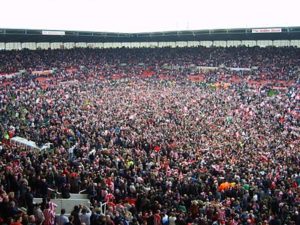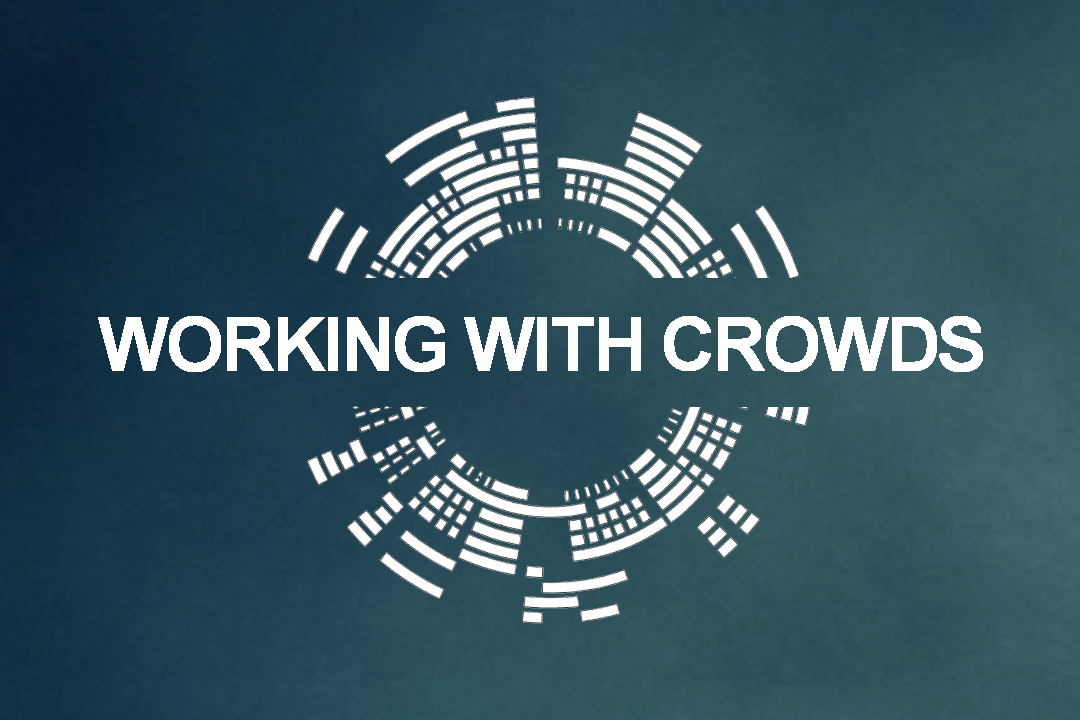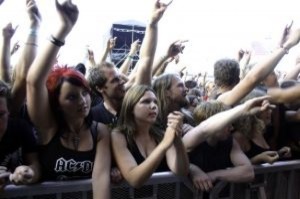Crowd profiling – labelling your customers
Have you noticed lately that music all sounds the same? Maybe it is an age thing, but this is the type of throw away comment you get from a percentage of the population. You tend to find this comes from people that listened to popular music in their youth and it was part of the social scene they moved in; there was no great love for music.
This is also reflected in the work place and within the management of stewarding/ crowd management companies. They can be broken down into specific areas:
- Those that focus on sporting event; possibly affiliate with a team/club
- Those that prefer music events
- Those that don’t mind what they do
There comes a time where they will be asked to provide a description of their customers, as a whole. A standardisation of the audience attending your events. I will give you a typical example of the standard profile for a rock concert:-
- 60/40 male to female split
- 16- 30 years old
- Heavy drinking
This is about it for the majority of events that we see, this is about how much thought goes into it. If you are lucky the promoter at a concert may go into a bit more detail.
For sporting events, the profiles are a bit easier and less likely to change over a period of time. Football clubs are slightly different. We are seeing the rise of the Ultra groups across Europe and this brings with it the element of risk. Thankfully the police pay a great deal of attention to them so we are provided with information when possible. There can be a tendency to focus on a handful of risk support though and neglect the rest of the customers. Something that has to be kept in mind.
When I comes to music, the profile of an audience is unlimited. The task that we are set with is understanding the audience for each show. Your typical busy venue will see multiple profiles over the course of a week. One night you may have the latest pop sensation, the next a classical performance, after that a death metal band and how about a rave to end the week off. Each attracts a specific profile of customer and a diligent crowd manager will understand the needs and behaviours of each.
Each band though has its own characteristics though. Certain genre are more generic and we can predict the audience across a wider range of acts or performers. More youthful music though is forever evolving. If you look at the hard rock scence this can be broken down into multiple sub-genres, each with there own crowd activity and attitude. Dance music is the same; multiple styles of music, but it has a high tempo and you can dance to it. If a band decide to be a little bit different though and try to avoid classification, they fail. They now get the Indie tag and stuck in a massive pot with the rest that follow the same path.
When it comes to multi band and genre festivals, you would think you can give a blanket profile and that would be the end of it. If you look closely though you will see each of these groups within your audience understanding this will assist you for each stage and the bands playing on them. You can predict the audience size, profile and movement about the arena.
Give a bit of thought to your customers and you can tailor fit your planning, customer service and crowd management techniques to your audience. If you don’t, then you could be in for a very hard night. If you do, you will find your customers more appreciative and compliant.
Spend more than ten minutes on this and God forbid, try doing some research. YouTube is gods gift to all crowd managers. We no longer have to rely on the word of others or a report from previous shows, we can now view the crowd activity. Those fanatical fans with their mobile phones and GoPros; they are doing you a massive favour. Use these tools well.
Workingwithcrowds 14th May 2015
Oh! Won’t somebody thing of the stewards
“Oh, won’t somebody please think of the children”
Helen Lovejoy, 1996
Yes, you are correct, I did just quote The Simpsons; this is a blog, not an academic piece of writing.
Do you? Do your clients? Do the architects? Think of the stewards.
That last one was a bit out the box, but do they? If we think about year round venues such as football stadiums, arenas, exhibition spaces even large night clubs; is the requirements of the stewards considered?
How many stadiums do you work at where there is no provision for the stewards. You will find briefings being conducted in concourses or seating deck. Stewards can be found hiding in fire exits or turnstiles trying to grab a bite to eat. The same turnstiles are filled with the bags and personal belongings of the stewards, looking to leave them in a safe place.
I have always thought it is difficult where a stadium/arena is dated and stewarding has been implemented through time, guidance and law. Is there really any excuse for modern built structures though? Are stewards thought of as so low, that through years or planning and construction, it takes the appointment of a provider before someone points out the stewards might need a place.
Just a point of note for all venue managers and architects preferring a statue of the art venue- stewards are the biggest workforce you are going to have on site at any time. Another thing to point out, they really don’t like travelling to work in brightly coloured cloths with company logos all over it. They also have jackets and bags and personal belongings that you don’t want them wearing whilst at work.
Would it be asking to much to ask for maybe a locker room? How about a small tea bar where they don’t have to pay the over inflated prices you charge customers.
These small things make a workforce feel part of the building. They feel the love, they feel wanted and not just an incovinece of necessity or a second class citizen.
So, maybe think about the work force that you need. Without them you can’t have your events. Bars, snack bars, merchandise are all the things that help money. Without stewards, you can’t even open your doors.
Thinking of the stewards now?
workingwithcrowds.com 13th May 2015
Knowledge is power
“Knowledge is power. Information is liberating. Education is the premise of progress, in every society, in every family.”
Kofi Annan
In an industry that concerns the safety of the public, no matter the size of the expected audience; people operating with the “Knowledge is Power” attitude are the biggest danger of all. Persons that operate this way are in danger of creating a greater safety risk for the event.
We can understand why they have this attitude; it safe guards their need, if they hold all the cards the promoters/organisers really on them being part of the event. But have they ever thought of the other side – what happens if they are not there, what if they are taken sick? It is not safe for an event to really heavily on one person. Anything that revolves around the ability or knowledge of one person has a higher percentage of failing.
When entering an event, I never go in blind and follow the information that is set forth for me. I prefer to overview the event first, a site visit, go through site plans and then monitor the event as it happens. I prefer to have my own opinions/ I am not saying that I think my opinions are correct and better than what is in place, but it provided me with the information to question what I see if it is required.
If you are entering an event and not being provided with information that you are requesting, have you asked why you have not been provided with it?
Event safety is not a dictatorship, it requires a leader, but it should be a team effort. That is why we have command and control structures, SAG’s and table top exercises these day. The sharing of information assists in creating a greater understanding of the safety requirements. Would you rather turn up for an event, not knowing very much and just follow the basic information provide for you. Or would you prefer to be asked about the planning of the event, allowed to input into the plans, become engaged with the process.
Knowledge is not power, information is power.
Workingwithcrowds 10th May 2015
The events industry and the zero hours contract silence.
In the UK we can concluded another general election, were one of the campaigning and manifesto points, was zero hours contract ( or exploitive zero hours contracts ). If you are not aware of this style of contract- you are contracted/ employed by a company and you get paid for every hour you work, but they are not obliged to give you work on a regular basis. Another name for it; and seeing a resurgence is – a casual contract.
The main focus was on retailers and the hospitality industry (bars and such), but the events industry managed to stay under the radar. This morning they will all be breathing a sigh of relief, with the returning government showing no interest in changing these contacts.
If you look at stewarding companies, could they survive changes to these contracts? Would the work force want them changed? There is no denying that within this industry there are personnel that should be either on part time or full time contracts and the benifits that go with them. The majority of the workforce though enter the industry with the understanding of how the pay structure works and that suits their needs. If any one is looking to sustain themselves in this way is clutching at straws, this is an industry of students, second jobs or those looking for flexability.
If stewarding companies where forced to change the contracts of their workforce away from zero hours/casual contracts, I would not be suprised to see many companies giving up the ghost. There are few companies that can sustain a part time work force within the stewarding industry. The impact of this would totally change the industry and how companies operate.
- The flexability of staffing numbers would stiffen
- Ticket sales poor for an event? Don’t expect last minute cuts in staffing
- Sporting events, if you need a deployment for a stadium, how do you flex that with poor or strong attendance. Visiting risk support? How do you gain the additional staff
- Last minute cancellations? Who foots the wages for the cancelled staff.
The zero hour contract is required for the stewarding industry, to allow the flexability the promoters and clients require. Changing this would decimate and possibly break a large section of the industry.
workingwithcrowds 8th May 2015
Who is the head of security at your festival?
I return to a subject I have pondered previously and look at it from a new angle. With crowd management companies growing larger and offering more to promoters, part of this provision can be a head of security.
The question I ask myself is, should the head of security be associated with the main supplier of crowd management to the event?
I am sure the sales pitch goes along the line of, it will assist in the working relationship and provide a more encompassing service. If the head of security knows all those under him/her in the chain of command surly this will provide a better service?
Is this a sales pitch though? There is no denying the capability of those coming from these companies. But is it to the benefit of the festival? Is the festival receiving the full service they require from a head of security?
If your head of security is tied to the main crowd management provider, are they going to be looking at the service they provide through Rose tinted glasses? Are they going to criticise them if they do something wrong? Are they going to point out the near misses? Are they going to let the promoter know that they are short on numbers? If working in partnership with other companies, are they going to present the ability of the other companies evenly; or are they going to try and blow them out so the can supply more from their company? Are they going to let inter company politics interfere with the role they have to deliver?
It takes great power and focus to separate the day job and the role of a head of security. The ability to remove the temptation to get involved in things that do not require you to look at, but, that is what pays your bills day in day out and you want to make sure it is balanced. The head of security should only be focused on the safety of the event at hand. They should not have to worry about his company delivering the required amount of stewards, the buses all arrived on time, the catering is arranged and so is the accommodation. This is down to the companies that have been appointed to provide crowd management services to arrange. The head of security just need to know it is done. He want to make sure the staff are equipped for the role, fed and well rested to perform the role and of sufficient quantity to cover the roles required.
Would an independent head of security not be of greater benefit? After all their only role is to deliver what he/she has been tasked with.
In an ideal world this is what I would be looking to implement….
- Head of Security (independent)
- 2iC to the Head of Security (independent)
- Sector managers for designated areas of the festival site (independent)
- Crowd management provider management structure
By providing an independent command and control structure to fit in with the festivals command and control structure an ability to observe and monitor the duties being performed can be achieved. We are not talking about spying or stabbing in the back. We are talking about a safety net for the promoter. Ensuring they are getting what they have paid for and what their costomers deserve; as safe an event as possible.
All this would cost money, but so does all safety features; is there another way to implement this though?
Has anyone thought about approaching Univercities and asking if their students would like to get involved? I don’t mean event management students, I mean crowd safety management students.
There are now a few courses; especially in the UK, where we are training the future of the industry. Could their skills be put to use if they wanted to get involved? If we can have volunteer stewards at festivals, can we take this model to assist make a more robust command and control structure.
What could it cost you; a site pass, catering, accommodation and travel expenses?
The benifits to both festival and student would prove to enhance the future of the industry. You never know, the festival might even find their next head of security this way.
workingwithcrowds 6th May 2015
Do we live on a knife edge?
In an industry that is limited by the amount of events that happen, we all fight over the same work. The winning and losing of a client makes a vast difference to a company. Not just in financial circles, but in reputation; which can have a greater impact in the long run.
The original crowd management companies and most established have built up their reputation over a period of time. Those that have lasted the test of time have proven they can deliver and make events safe. Like all industries though, new companies start and they all want a piece of the pie. How do they get their foot in to door?
Most of them will be subcontracted in by the larger companies because they do not have the in house man power to man their contracts (don’t worry, we all know you do it and so do your clients). This is the point where a company takes on that much work they can no longer cover the event, so going to smaller companies to back fill their short falls. The old tricks of hiding them in the companies uniform are well established. (Is this building a relationship of trust?)
After a bit though, these smaller companies will start wanting more and they will challenge your contracts. You helped build them up and they know your events because they have been working on them; so your own shortfalls and greed have created the problem.
The first thing all of these companies will think of is hitting you where in hurts; in the wallet. They are smaller and will have less overheads, no shareholders and can run for less. This means they can charge less, so undercut you. Everyone looks to make as much money as possible, especially the people booking and organising the events; this will make these smaller companies more attractive. Eventually, they will start chipping away.
This leads us to the crowd management industry being just like every other industry – money orientated.
To achieve this we have sales plans, sales persons, advertising campaigns, glossy adverts, pricing strategies and a bending of the truth (yes, you know you all do it).
We are supposed to be focused on safety? Not sales! We all understand that a company has to make money to stay afloat, but in such a short period of time money seems to have taken control. I am sure we could all name and shame and fling mud at the companies out there, but does that make is better. Just think if you are doing the following though?
Hiding subcontractors in your deployments?
Using the power of a bigger organisation to gain a contract?
Wining and dinning a potential client, instead of showing them your operation in action?
Miss leading statistics on your abilities and training?
Telling everyone you are the best; when really you are no different to everyone else?
Wanting to take it all instead of working in partnership?
Think about how you and your company have changed. Money is a great thing, but at what cost.
A safety industry that is dictated by money, is nothing short of false.
workingwithcrowds 6th May 2015
The growing trend of the end of season pitch invasion – can it be prevented?
We have reached (reaching) the end of another football season in the UK and with it comes the annual pith invasion scenes from across the country. What started out as a once in a Blue moon occurrence is now spreading across the country. I guess we can thank social media and especially YouTube for that.
With everyone now having video recording capability on their mobile phones and the ability of posting this straight onto the internet, we are seeing this increase across the leagues. The question is; can it be stopped?
When you look at Premiership team such as Manchester City; and the volume of stewarding they have at their home ground, fail to prevent this happening, is it realistic to expect lower league teams to cope. A stadium such as Man City can be expected to have 400/500 + stewards on site for the final game of the season if the team is going to win the league at home. This is a sizable amount, but can they really hold back 40,000+ fans if they decide to come on the pitch?
This is a question I regularly ask myself – if everyone at an event decided not to comply with the commonly conceived rules and acceptable behaviour, could we prevent them doing what ever they wanted. Just like the Christians have been supplied with the 10 commandments to give them a hint and a poke in the right direction, so the governing bodies and government supply rules and regulations to tell us to behave.
In reality, we require these rules being complied to.
The pitch invasion has presented us with the situation were our customers have decided that to assist them celebrate they are taking back a bit of the control we hold over them. So how do you combat it? Do you throw stewarding and policing at it? Build a wall of Hi Vis jackets in a hope that the customers decide to stay on the terraces. Or, do you help it happen and put in safety measures?
A wall of Hi Vis can have an adverse reaction between steward/police and the customers. It might be seen as an act of aggression on the part of the club and stewards. A simple mistake could lead to violence and injury on both sides. You are telling the fans we have control and you shall not have your fun. This can turn what should be a joyful occasion into something sour.
Have we thought about accommodating the fans, allowing it to happen and making it safe?
Should we give thought to it? Do we look at the whole picture, or do we just say “No”?
Maybe something we should start discussing.
workingwithcrowds 6th May 2015






